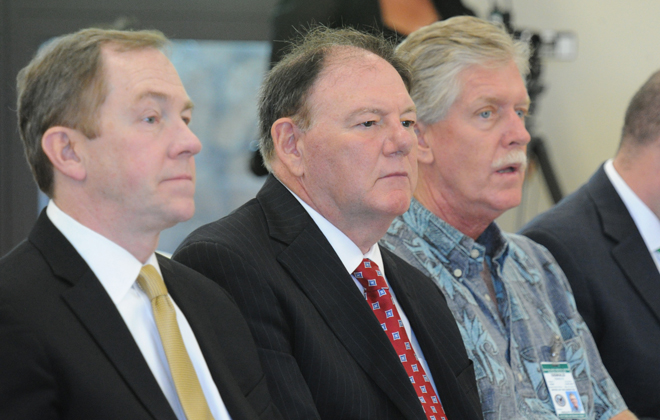High-ranking U.S. Department of Veterans Affairs officials from Washington, D.C., and Hawaii on Monday heard directly from island veterans about their long list of frustrations that include delays and the high cost of getting VA medical treatment on Oahu.
Seven VA officials — all wearing dark business suits and, in one case, a dress Army uniform — sat in the audience at the Oahu Veterans Center in Foster Village as Fred Ruge of the Maui Veterans Council said the VA "has to treat Hawaii differently. They don’t appreciate these small islands."
Hawaii is home to an estimated 100,000 veterans, of whom 45,000 qualify for VA medical benefits, said U.S. Sen. Mazie Hirono, a member of the Senate Veterans’ Affairs Committee, who presided over Monday’s hearing.
Hirono hopes the hearing will help lead to better communication between veterans and administrators about how to fix long-simmering complaints that at one point this year gave the Hawaii VA the ignoble distinction of having the longest delays in the entire system for patients trying to get a first appointment with a primary care physician.
Hirono told the Honolulu Star-Advertiser that veterans have "unique circumstances in Hawaii," such as high costs that are often not reimbursed to travel long distances to get VA treatment, unlike other parts of the country.
Because of the distance to the mainland, VA doctors and technical staff who quit sometimes leave vacancies that can take up to a year to fill, testified Wayne Pfeffer, director of the VA Pacific Islands Health Care System.
Technological efforts to make up for staff shortages, such as video conferences for neighbor island veterans and information on the VA website, often don’t work, said Cummins Kameeiamoku Mahoe III of Maui.
Maui County has 11,000 veterans, Mahoe said, but there is only a one-hour window per day to communicate with an Oahu-based counselor via video conference. About three patients can be seen in an hour.
"Because of Hawaii’s geographic isolation, Molokai vets have missed their Maui appointments because ticketing was not available for their appointments," he said.
And elderly veterans have difficulty with technology, said Ruge, an 84-year-old veteran of the Korean War.
Most of his fellow veterans don’t know how to use the Internet or "get confused," Ruge said. "I have a difficult time with it."
Capt. Elisa Smithers of the Hawaii Army National Guard served combat tours in Iraq and Afghanistan, where she suffered a concussion, pelvic injury, back problems and a traumatic brain injury. She returned to Hawaii with anxiety, post-traumatic stress disorder, a drinking problem, nightmares, violent outbursts and thoughts of suicide.
She slept in her closet to curb her anxiety and at one point threw her daughter through a glass window when Smithers thought she was being attacked.
"I wasn’t sleeping," Smithers told Hirono. "I was afraid of hurting myself or someone."
Before she even got an appointment to see a physician, Smithers said that a VA official told her, "No offense, you’re a female. What could you have seen that was that bad?"
Smithers worried that getting treatment for suicidal thoughts would end her Army National Guard career, but nevertheless scheduled an appointment at the VA facility at Tripler Army Medical Center that took 18 months to get.
Even though she was treated for her bad back, Smithers said she was refused treatment for PTSD and her traumatic brain injury.
"I swore I would never set foot in the Tripler VA again," Smithers said. "The system is just too large."
Later, Pfeffer told Hirono: "It’s very disheartening when I hear a veteran who doesn’t get what he deserves. I want them to feel real entrusted in our system."
Pfeffer was joined by the VA’s acting principal deputy undersecretary of health and told Hirono that the number of veterans in Hawaii has grown 20 percent in just three years, one of the largest increases in the VA system.
Pfeffer hopes that a VA town hall meeting scheduled for Sept. 26 at the Oahu Veterans Center — as well as future town hall meetings on each of the neighbor islands — will lead to more ways to address veterans’ concerns.
Pfeffer is now speaking monthly with neighbor island veterans groups to hear their concerns, he said.
And in the fall, he is expected to finish a draft report of the VA throughout Hawaii and Micronesia that could provide a "road map" of where the Hawaii VA goes.
Hirono applauded Pfeffer for cutting patient wait times by adding weekend hours and by paying outside contractors and staff overtime.
But Hirono said she wants a "sustainable" system of ensuring quality patient care without long delays.
Pfeffer responded that he continues to recruit three new primary care doctors for the Tripler VA and is hiring more support staff "so physicians can spend more productive time with patients."
He has also met with the University of Hawaii medical school to recruit residents, as has Hirono.
"They would welcome more residency slots with the VA," Hirono told Pfeffer. "I commend you for that."
But Hirono was also clear in addressing the VA officials about her concerns.
"This is not news to you all that the veterans feel very frustrated that their needs are not heard," Hirono said. "There is a lot of work ahead of us."






